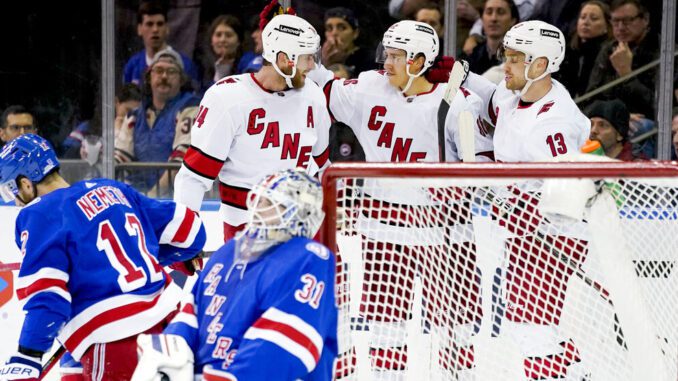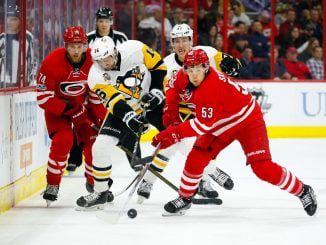
RALEIGH — Parity is alive and well in the NHL.
Five of the eight first round series went to seven games and two others to six. Only Colorado, which dispatched Nashville in four straight games, made quick work of their Round 1 opponent.
“I don’t think anybody’s surprised,” Hurricanes coach Rod Brind’Amour said before his team’s Game 7 matchup Saturday with the Bruins. “I think any one of these teams in the East, if you said they were going to be the champs at the end, we wouldn’t go, ‘Oh, that’s shocking.’”
There are no easy outs in the Eastern Conference, and after Carolina eliminated Boston with their 3-2 win they now get another tough opponent in the New York Rangers.
Like the Bruins, the Rangers have a Hall of Fame level player, one of the top young defensemen in the game and a host of complementary players who each bring something different to the table.
“There’s a lot of similarities,” Brind’Amour said.
Oh, and their goalie is pretty good too.
Before the series starts Wednesday at PNC Arena, here’s a closer look at what the Hurricanes need to do to stop each area of the Rangers’ game.
Forwards
New York is led by Artemi Panarin, the 30-year-old Russian who has averaged 1.34 points per game since signing his blockbuster free agent deal with the Rangers before the 2019-20 season.
While Panarin doesn’t score a ton (71 goals since coming to the Big Apple), his 178 assists the past three seasons trail only Connor McDavid (214) and Jonathan Huberdeau (181). He also had the overtime winning goal in the Rangers’ Game 7 win over Pittsburgh that got them to the second round.

Most of the goals have come from Chris Kreider, who at age 31 had a career year with 52 of them, 24 more than his previous career high. Twenty-six of his goals this season were on the power play.
“He’s probably the best guy in front of the net in the NHL, especially on the power play,” Hurricanes defenseman, and former Kreider teammate, Tony DeAngelo said.
Defenseman Brady Skjei, who also played with Kreider in New York, described him as “a horse.”
“He’s a big guy,” Skjei said of the 6-foot-3, 223-pound left wing. “He’s hard to move once he gets planted in front, and he’s definitely tough to get out of the way.”
Center Mika Zibanejad is the other big weapon on New York’s front lines, an all-situations player who is used similarly to how Carolina deploys Sebastian Aho — lots of power play time, tons of shorthanded minutes and the expectation to be a difference-maker in all three zones.
Ryan Strome and deadline addition Andrew Copp provide depth scoring, while Alexis Lafreniere and Kaapo Kakko were top-of-the-draft picks who have yet to realize their potential. New York will be without Barclay Goodrow for at least the start of the series after he was hurt in Game 1 against the Penguins.
Defense
Brad Marchand got all the boos from the Hurricanes fans in the first round, and last year’s Norris Trophy winner Adam Fox will get them in this series.
It’s not Fox’s antics on the ice that draw the ire of the Caniacs but rather his decision off it. He was the third piece that came to Carolina in the blockbuster 2019 trade that sent Noah Hanifin and Elias Lindholm to Calgary for Dougie Hamilton and Micheal Ferland, but he had his eyes set on Broadway from the start.
Rather than lose him for nothing, the Hurricanes traded the rights to Fox to New York for two second round picks. Fox has been a plug-and-play No. 1 defenseman for the Rangers since — and surely the Hurricanes wonder what could have been if they convinced him to come to Raleigh.
Jacob Trouba is the other big name on the Blueshirts defense, and both Ryan Lindgren and K’Andre Miller are logging big minutes as young and talented defenders.
Goaltending
Igor Shesterkin is a lock for the Vezina Trophy this season.
“You can see he’s a pretty good goalie,” Hurricanes forward Teuvo Teravainen said Monday. “He’s been good all year.”
He’s not, however, invincible. Shesterkin was “good not great” in the first round, finishing with a .911 save percentage and 3.67 goals-against average. He also had a tough time against the Hurricanes this season.
Shesterkin lost his two starts, both at Madison Square Garden, to Carolina during the regular season, stopping 53 of 60 shots (.883 save percentage) in April matchups that helped the Hurricanes sew up the Metropolitan Division.
Shesterkin also won all three of his starts against Tampa Bay this season, the bright spot in a 6-6-0 record against the seven remaining playoff teams.
All that said, he is capable of stealing a series by himself.
On the ice
The Rangers ranked fourth on the power play (25.2%) and seventh on the penalty kill (82.3%) during the regular season. Carolina’s PK was a league-best 88.0%, while power play finished 13th at 22.0%.
Special teams will play a huge role. Just like the Bruins series, the Hurricanes will likely be content to play as much 5-on-5 hockey as they can.
New York gave up 20 full-strength goals in the first round against Pittsburgh compared to just 10 allowed by Carolina, and no team gave up as many 5-on-5 scoring chances (225) as the Rangers. The Hurricanes yielded just 135.
The high-danger scoring chances were even starker. The Rangers gave up 116 at 5-on-5 to the Penguins — 22 more than the Kings, who gave up the second most, and a whopping 71 more than Carolina allowed to the Bruins. New York finished with eight more high-danger chances than the Hurricanes had in Round 1 (56-48).
The regular season saw New York rank 28th in scoring chances differential and 21st on high-danger chances. The Hurricanes were third in both.
The lesson: If this series is played at 5-on-5, anything outside of a Herculean performance by Shesterkin gives Carolina a giant edge.
“When we’re on our game, we’re staying out of the box, I think we’re very confident no matter who we play that we’re going to come out on the winning side,” DeAngelo said.
Prediction
One could argue that the Rangers have the best forward, defenseman and goaltender in the series. But the Hurricanes had 14 players with at least 25 points during the regular season, including nine with 40. New York, meanwhile, has eight and five, respectively.
Depth matters, and it’s Carolina’s best attribute. Special teams or Shesterkin could swing the series, but it looks like a mismatch.
The Rangers’ power play wins them one, Shesterkin steals another, but Carolina wins in 6.



